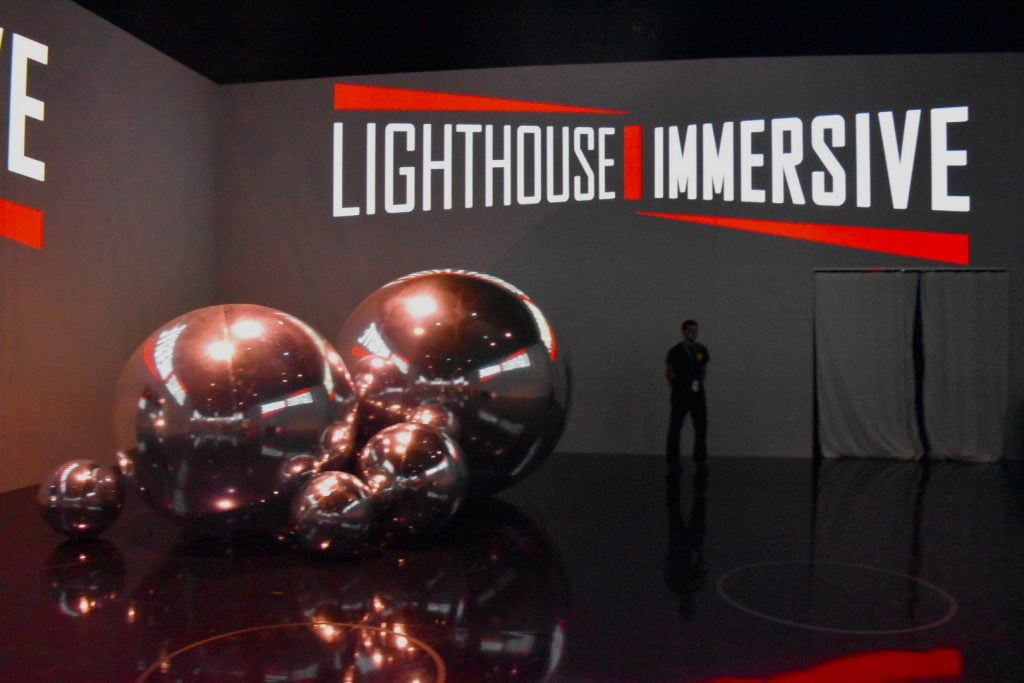Curiosities
How Did Immersive Van Gogh Top Taylor Swift? Does Anyone Ever #AskaCurator? + Other Questions I Have About the Week’s Art News
Most importantly: Has Maurizio Cattelan's 'America' toilet been melted down for gold bars?

Most importantly: Has Maurizio Cattelan's 'America' toilet been melted down for gold bars?

Ben Davis

Curiosities is a column where I preserve for posterity the “you can’t make this up” parts of the art news.
Below, some questions posed by the events of the last week…

America (2016), a fully-working solid gold toilet, created by artist Maurizio Cattelan, at Blenheim Palace in September 2019. Photo: Leon Neal/Getty Images.
Last week marked the two-year anniversary of the brazen heist that rocked the international art world like no other: the theft of Maurizio Cattelan’s multi-million-dollar gold art toilet from Blenheim Palace. Despite a reward of $130,000, and the (apparently pointless?) arrest of no fewer than seven suspects in the intervening years, the BBC reported that authorities working on the toilet case have lost the scent.
The Case of the Golden Bowl is likely to go down with the Gardner Heist as one of the great unsolved art crimes of our day.
The work (one of three such golden toilets made by Cattelan) was cheekily titled America, and was installed as a functional potty in Winston Churchill’s former bathroom in Blenheim Palace as part of the venue’s unveiling of a Cattelan retrospective, itself prophetically titled “Success Is Not an Option.”
Two years on from the daring early-morning burglary, we must face the cold, hard, gleaming reality: the toilet may have been scrapped for its 18-karat parts. Its powerful critical message—“I am a gold toilet in Winston Churchill’s house and you can pee in me”—may be lost forever.
It is very hard to get truly mad about this. Locals were mainly amused, decorating the toilets of a variety of village eateries in gold paint. Cattelan himself said he hoped that the theft was “a kind of Robin Hood-inspired action”—and then, not two months after the theft, did a confusing commercial for an art insurance company in which he strutted and mugged, clad only in images of America (among other works). The ad carried the tagline “Great Artists Steal,” which I guess kind of reads as Cattelan’s endorsement of the Blenheim thieves.
So the main tragedy here was basically water damage at Blenheim Palace and a seriously red face for Edward Spencer-Churchill, the founder of the Blenheim Art Foundation and brother of the 12th Duke of Marlborough. In the run-up to the show, he had told the Sunday Times—with breezy, note-perfect hubris—that the owner of America had nothing to worry about during the palace’s exhibition: “Firstly, it’s plumbed in, and secondly, a potential thief will have no idea who last used the toilet or what they ate. So no, I don’t plan to be guarding it.”
Leave it to a lord to think that no one would bother to steal millions in unguarded gold if they had to work and possibly get their hands dirty to do it.
And yet hope remains. When it was installed at the Guggenheim back in 2017, curator Nancy Spector noted that America was “laden with possible meanings,” adding that, “the equation between excrement and art has long been mined by neo-Marxist thinkers who question the relationship between labor and value.”
And so it is just possible that the gang that seized America got to the point of melting it down into ingots, when the light of the furnace flared up in the commode’s luminous surface and epiphany hit: “Hold up, boys! Is this an unheralded three-way synthesis of Marcel Duchamp’s Fountain with Piero Manzoni’s Artist’s Shit and Damien Hirst’s For the Love of God? It must be saved!” In art anything is possible.

A credit for Lighthouse Immersive, the company behind “Immersive Van Gogh,” within the experience. Photo by Ben Davis.
Kriston Capps’s panoramic report on the immersive Van Gogh room phenomenon in CityLab this week brings us this nugget from Corey Ross, head of Lighthouse Immersive, the company behind one of the many, competing touring Van Gogh light shows: “We just passed 3.2 million tickets sold, which, as I understand it, makes it the most successful attraction in the world on Ticketmaster.”
I looked this up to see if it was possibly true. It is possibly true!
It’s an apples-to-sunflowers comparison, of course, but Pink’s “Beautiful Trauma” tour in 2019 sold “over 3 million tickets” across 159 venues, and was that year’s biggest music event (I literally did not know Pink was still making music, but there you go). So the Immersive Van Gogh Army does indeed fight in that league. Even Taylor Swift’s 2018 “Reputation” tour sold a mere 2.5 million tickets, so evidently the allure of a really big projection of the Potato Eaters trumps “Look What You Made Me Do”-era Taylor by hundreds of thousands.
There are, however, worlds left to conquer for Immersive Van Gogh.
It may be difficult for Lighthouse Immersive to top Ed Sheeran’s record-busting “Divide” tour, which sold 8.9 million tickets across 258 venues, unless they consider a team-up. Imagine: “Shape of You” and Starry Night, together? The Night Café feat. “Galway Girl”? No venue on Earth could contain it.
September 15 marked the 2021 edition of the long-running #AskaCurator day on Twitter. And as usual, the Twitterverse’s reaction to #AskaCurator day was a resounding, “Can you believe what just happened on #BachelorinParadise?”
#AskaCurator day should be that brief and precious moment when the overworked and underpaid finally get to strut their obscure and specific knowledge sets in front of the public. Mainly though, it feels a bit like watching people perform a chore.
Curators from many and varied institutions spent hours last week earnestly weighing big questions such as, “How do you deal with spiders and cobwebs?” (“There’s a detailed cleaning programme”) and “What do curators wear?” (“Depends on what I am teaching that day.”)
Don’t get me wrong, there’s some gold in there. Love this from the National Cowgirl Museum:
It's #AskACurator today! What is an object that people would not expect to be there?
Jon Snow’s saddle, from Game of Thrones! The actor Kit Harrington used this saddle when filming scenes horseback. We have this saddle on loan from Honoree Camilla Naprous, the Horsemaster. pic.twitter.com/zTCNGo8k1Q
— Natl. Cowgirl Museum (@cowgirlmuseum) September 15, 2021
But not every institution can have Jon Snow’s saddle!
#AskaCurator’s heart is in a good place, and these sorts of social media engagement initiatives aren’t futile. Last year’s #CuratorBattle to post “creepiest museum objects” was a galloping (if nightmare-inducing) good time. But scrolling through pages of #AskaCurator Tweets, I do start to realize that soliciting the general public to #AskaCurator is a bit like asking me to prepare questions for, I don’t know, someone who wraps gifts for a living.
I’d probably ask, “So, how did you get into wrapping gifts for a living?”
Then I’d ask, “What are some unusual gifts you have wrapped?”
Then nothing further comes to mind.
And that’s #AskaCurator day.
I feel like National Trust curator Matthew Constantine kind of sums things up:
Those #askacurator stats in full*:
31% = museums hoping someone will ask them a question this year
47% = museum bods critiquing concept of 'the curator'
19% = people critiquing concept of a 'museum'
3% = 'What's the most valuable/oldest/weirdest thing you have?'(*figs approx)
— Matthew Constantine (@constantwhine) September 15, 2021